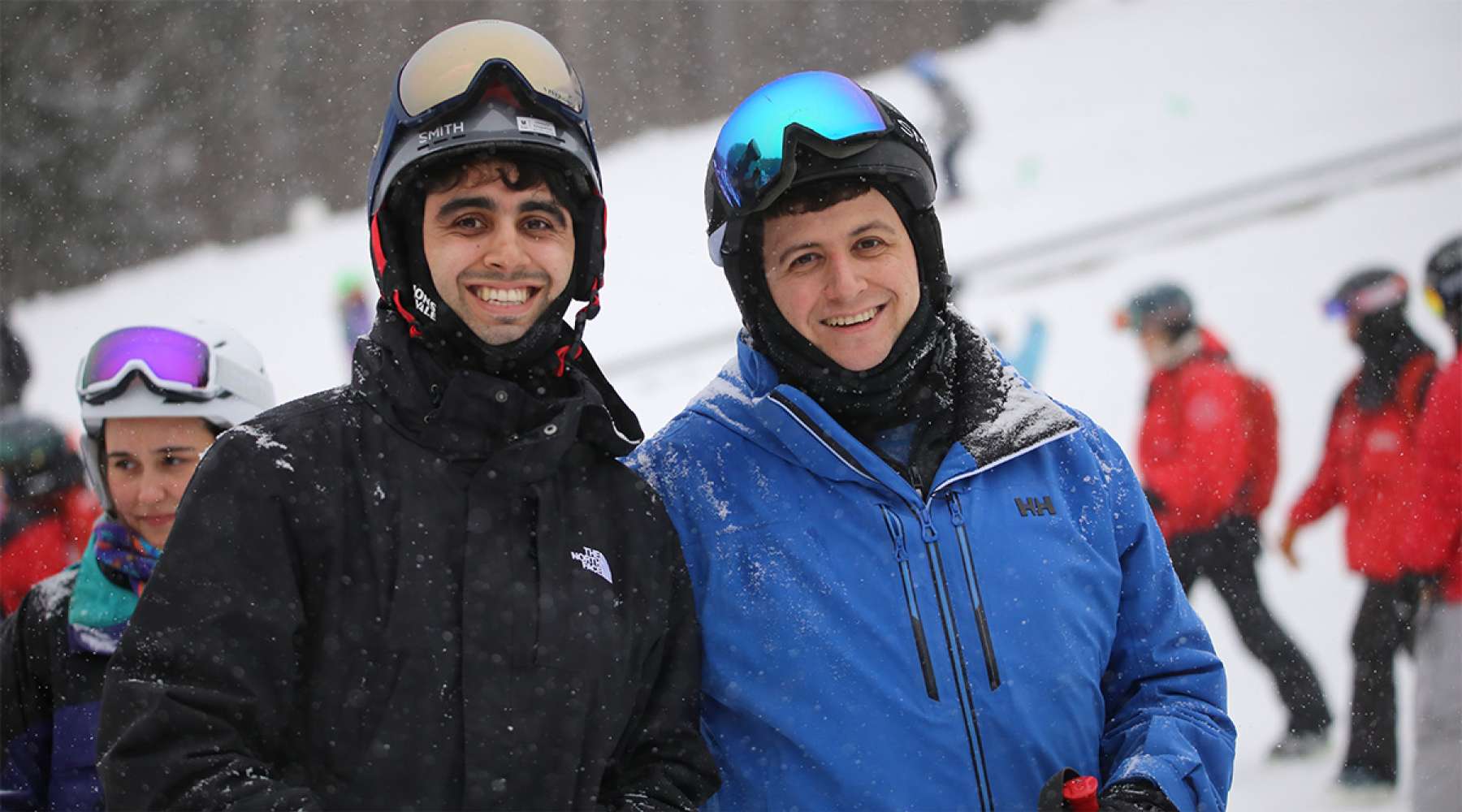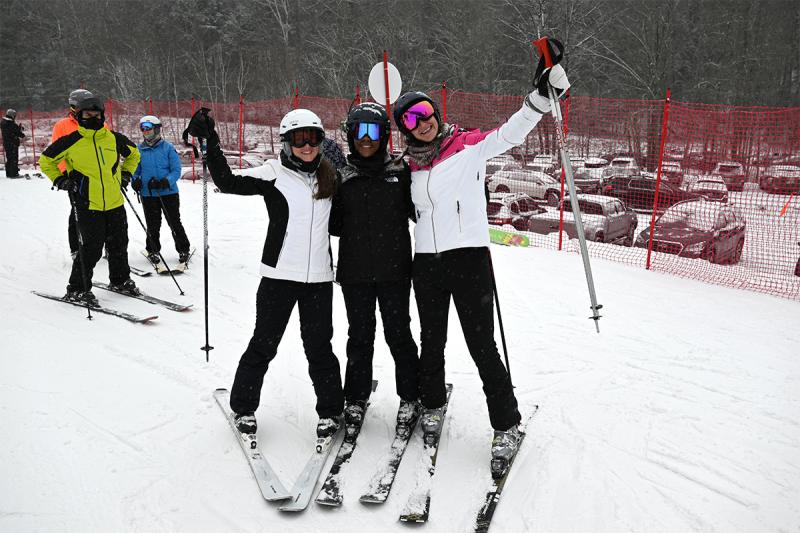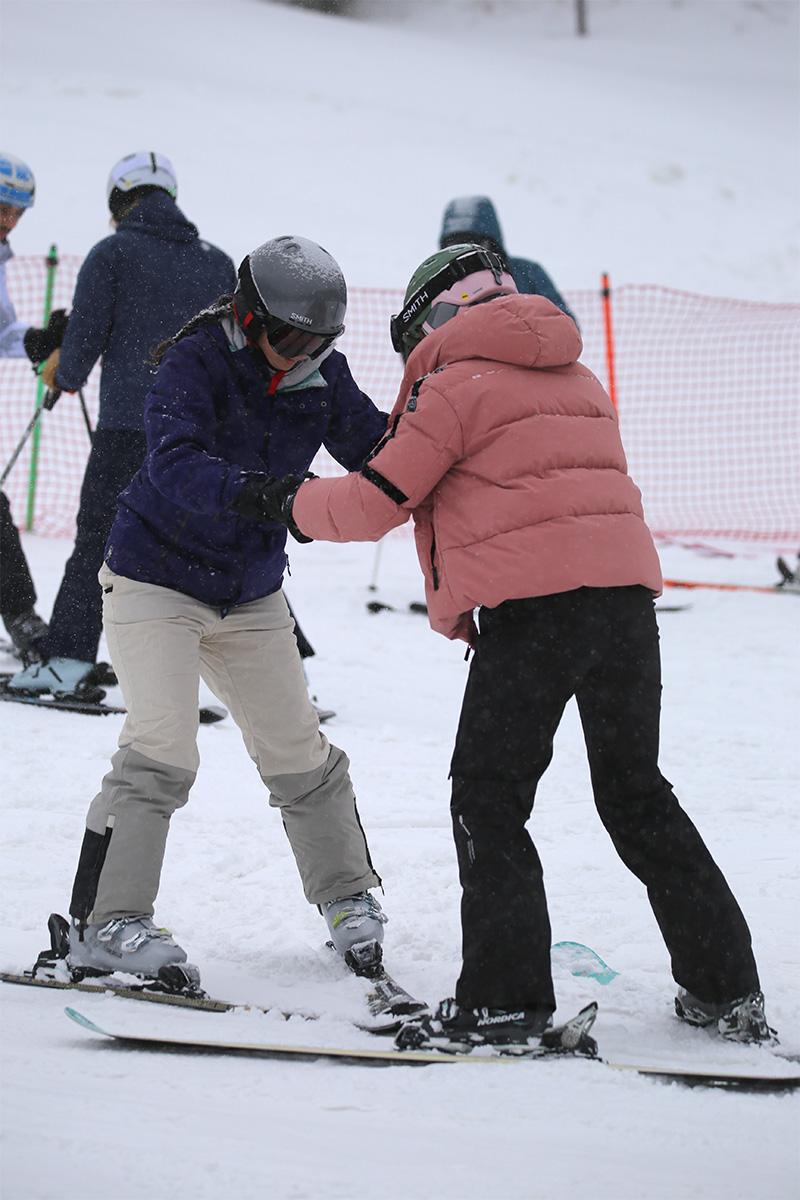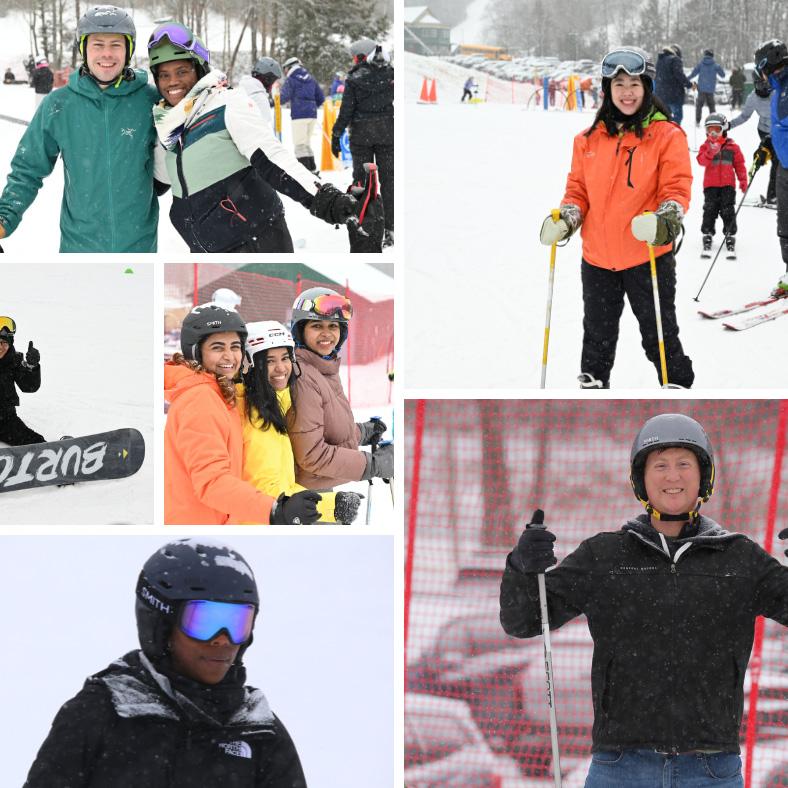
At Tuck, outdoor activities—especially skiing—are often seen as a core part of the experience. But for many students, hitting the slopes for the first time can feel intimidating due to financial, cultural, and logistical barriers. Recognizing this, T’25s Tucker Kavanaugh and Azael Paz set out to change the narrative by launching Diverse-A-Ski, an event designed to make skiing more accessible and welcoming to all.
Their own experiences with the sport couldn’t be more different. Tucker grew up in Massachusetts and learned to ski at age four, and his passion for it has shaped nearly every major life decision since. Azael, on the other hand, was born in Mexico and raised in Los Angeles, where skiing was never on his radar. He didn’t step onto the slopes until he came to Tuck—learning to ski at 28 and quickly developing a deep appreciation for the sport.
Together, they set out to create an event that would help others experience the joy of skiing in a supportive and inclusive environment. We sat down with them to learn more about how Diverse-A-Ski came to be and what it meant for the Tuck community.
Azael: I was learning to ski last year, and I became really passionate about it. One day, Tucker asked me, “Why don’t more people try skiing? What are the barriers?” That question stuck with me because there are so many challenges—access to equipment, cost, knowledge, transportation, even finding people to teach you. I was fortunate to have friends who guided me through it, but I realized not everyone has that support.
That’s when we started thinking: What if we created an event to remove some of those barriers? We wanted to make skiing more accessible and help others go through the same learning process I did—but with built-in support.
Tucker: Diverse-A-Ski was the first-ever “learn to ski” event at Tuck. It took place in early January and brought together about 70 first-time skiers, along with 30 volunteer coaches who were their fellow classmates. The coaches volunteered their time, cars, and even their own gear to make it happen. It was truly a grassroots effort—just a group of people coming together to make skiing more accessible.

Azael: One student came to the event in jeans because he didn’t have ski gear. But by the end of the day, he told me, “I’m sold. I’m buying everything I need to ski this season.” That moment stuck with me—seeing someone go from uncertainty to fully embracing the sport in just one day.
Tucker: I was helping a first-year student from Africa who had never even seen snow before. He was struggling on the bunny slope, and I thought he was having a rough time. But later that night, he found me at a campus event and said, “That was the most fun I’ve had at Tuck.”
Beyond that, the impact has lasted well beyond the event. Months later, people still come up to us to say it was their best day of the winter. Even some of the experienced skiers who coached have told us how meaningful it was.
Azael Paz: A big part of accessibility is financial, and we were able to subsidize lift tickets and rentals, which made a huge difference. But beyond the cost, there’s also the knowledge gap—What do you rent? What do you wear? How do you even get started? I was lucky to have a friend, Caitlin, who took me out once or twice a week and really showed me the ropes. But not everyone has that kind of support.
This event was designed to provide that experience in an organized way. People knew that if they signed up, everything would be taken care of—they’d have gear, guidance, and a supportive group of classmates to help them get down the mountain.

Tucker Kavanaugh: Skiing remains a predominantly white sport, which can contribute to feelings of exclusion or discomfort for some people. But if we could get 70 people from different backgrounds on the bunny slope together, the entire environment would shift. Suddenly, you don’t feel like the odd one out. You’re surrounded by people who look like you, who are learning alongside you, and who are having a great time. That sense of community was really powerful.
Azael Paz: I tell prospective students all the time—business school is your chance to push your boundaries and try new things. You don’t have to love every activity, but you might be surprised at what you end up enjoying. I tried skating, and while it’s not my favorite, I’m glad I gave it a shot. Tuck makes it easy to step outside your comfort zone with the support of your classmates.
Tucker Kavanaugh: As someone who is very outdoorsy, I’d say that Tuckies are just inherently generous with their time and passions. If you’re nervous about skiing, hiking, or cycling, there will be so many people excited to help you get started. And if you’re more of an “indoor cat,” that’s completely fine, too! There’s no pressure—it’s just about having the opportunity to explore if you want to.
Azael Paz: A lot of students—especially international students or those from underrepresented backgrounds—might feel like outdoor activities aren’t “for them.” But just having someone extend an open invite can make a huge difference. If you’re planning a ski trip, a hike, or a cycling ride, think about who in your network hasn’t been and invite them along. That’s half the battle—making people feel welcome and included.
Tucker Kavanaugh: The clubs at Tuck are a huge resource for this. Every club is free and open to all students, which isn’t the case at every business school. Whether it’s the Ski Club, the Outdoor Club, or the community cycling group, students can join and get guidance from experienced classmates. If you’re new to something, all you have to do is post in GroupMe, and you’ll be flooded with invitations and advice. That kind of openness makes a big difference.
Azael Paz: The biggest takeaway from this event was just the passion—passion from the organizers, from the volunteers, and from the participants. Everyone was invested in making this a great experience, and that energy was infectious.
Tucker Kavanaugh: Yeah, and I think that’s what Tuck is all about. Whether it’s skiing, career development, or just getting through a tough assignment, people here show up for each other. And that makes all the difference.
